Expiry Rules for EPS Prescriptions
It is important that dispense notifications and subsequent reimbursement claims are carried out in a timely fashion to ensure Electronic Prescription Services (EPS) remuneration issues do not arise. However, you should be aware of the expiry rules that exist and set your operating procedures to avoid encountering related complications.
The expiry rules for prescribed items primarily depend on the legal classification of the item being prescribed. The expiry of an item can also depend upon whether it was prescribed as an acute, a repeat or a repeat dispensing item .
Prescribed Item and Prescription Expiry
Legally, expiry is based on the prescribed item not the overall prescription. The NHS Spine, however, calculates expiry at the prescription level.
For example:
An acute prescription that contains a schedule 2, 3 or 4 controlled drug (CD2, CD3 or CD4) and a non-controlled drug. These items individually expire after 28 days and 6 months respectively, however, when both items are present on a single prescription, after 28 days has elapsed, the CD4 is marked as expired whilst it is still possible to dispense the unscheduled item as long as it is within the 6 month expiry period.
Issue Date
The expiry of a prescription item runs from the issue date (also known as the start, appropriate or prescribed date) of the prescription. Typically, it is the date the prescriber produces the prescription.
It is possible that a prescriber may wish to post date a prescription, meaning that they have set a prescription to start at a date in the future, next week for example. In these instances the prescribing system retains post dated prescription until the issue date, at which point they are placed on the NHS Spine.
Date of Expiry Calculation
Some prescription items expire after 6 or 12 calendar months. There are situations where, for example, the prescribing month has more days than the month of expiry.
If the day of prescribing is greater than the number of days in the month of expiry, then the expiry day is set as the last day of the expiry month. For example, a prescription issued on 31st March would have an expiry of 30th September.
12 month expiry date prescriptions, expire on the same date the following year. For example a prescription with a issue date of 15th May would expire on 15th May the following year. Prescriptions issued on 29th February in a leap year will expire on 28th February the following year.
Time of Expiry
All prescriptions expire at 23:59:59 on the date of expiry regardless of the time they were written.
For example, a standard prescription item on a prescription written at 15:39 on 23rd May expires on 23rd November the following year at 23:59:59.
Example scenario 1
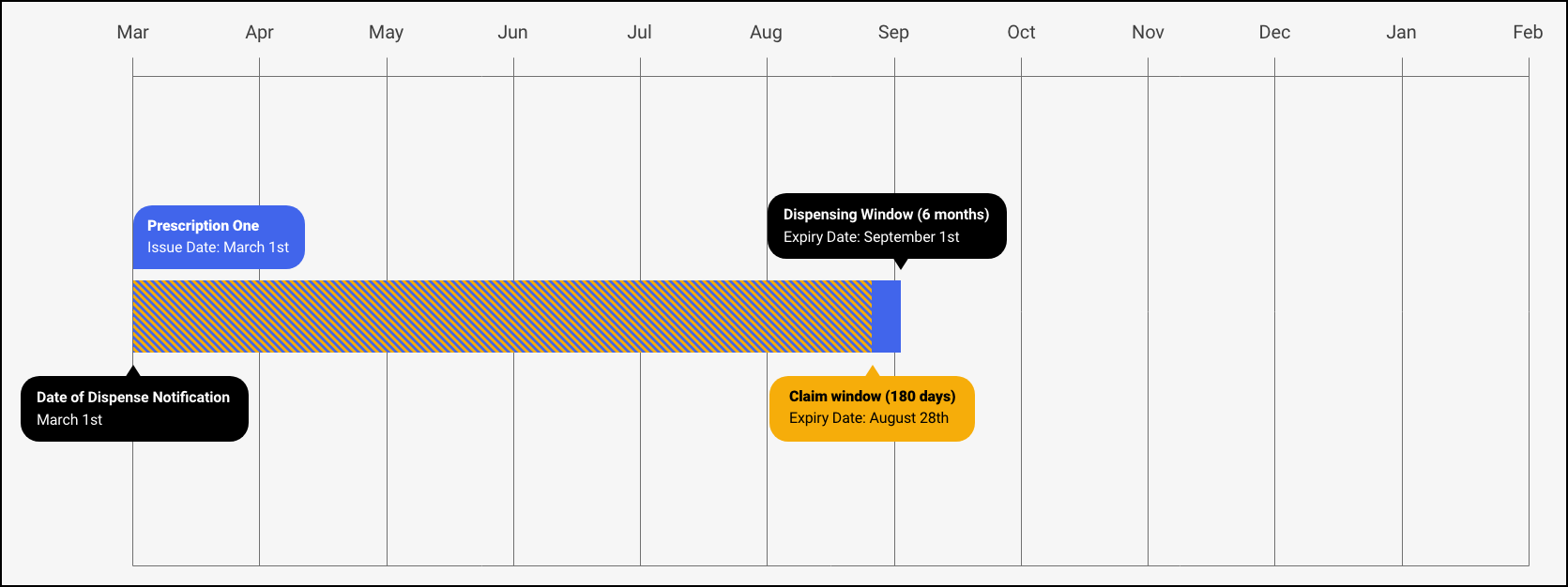
In this example:
-
A prescription is issued on the 1st of March so the dispensing window is set as the 1st of September, 6 months after issue date.
-
The prescription is dispensed and a notification is sent on the 1st of March therefore the claim window is set as the 28th August, 180 days after date of dispense.
Example scenario 2
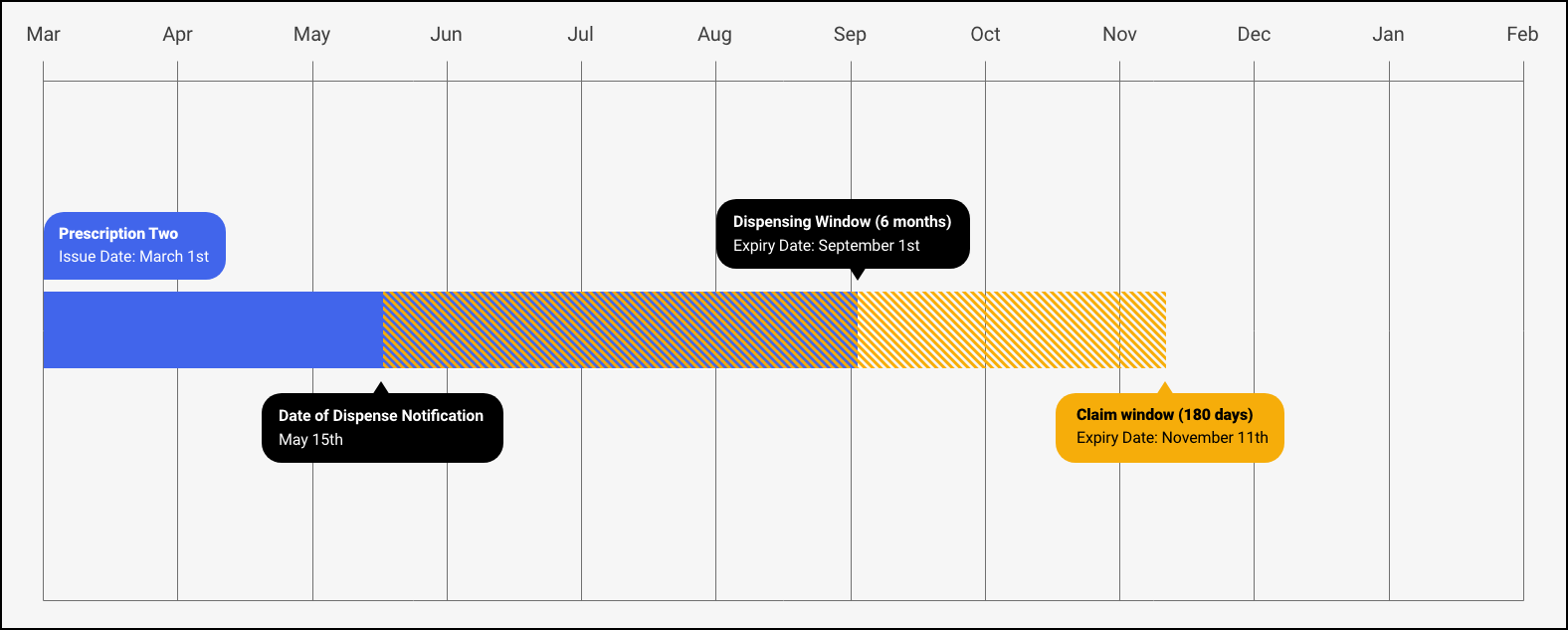
In this example:
-
A prescription is issued on the 1st of March so the dispensing window is set as the 1st of September, 6 months after issue date.
-
The prescription is dispensed and a notification is sent on the 15th of March therefore the claim window is set as the 11th of November, 180 days after date of dispense.
Example scenario 3
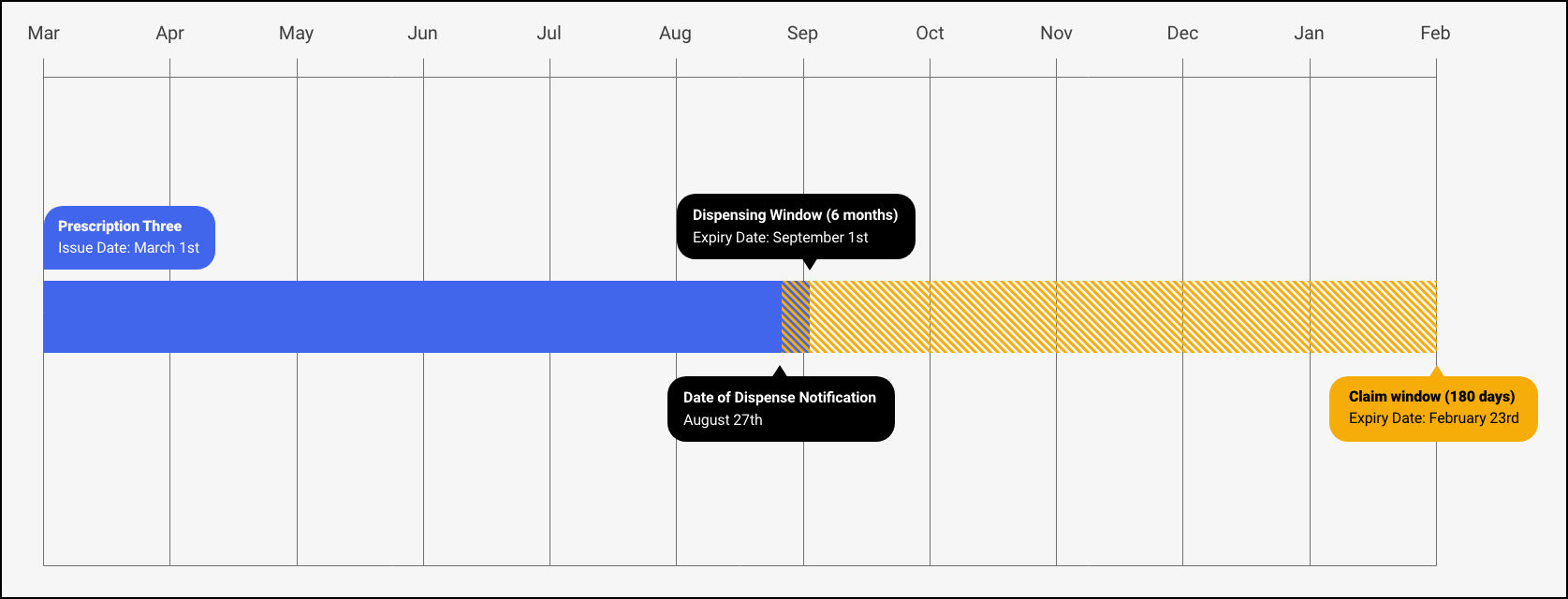
In this example:
-
A prescription is issued on the 1st of March so the dispensing window is set as the 1st of September, 6 months after issue date.
-
The prescription is dispensed and a notification is sent on the 27th of August therefore the claim window is set as the 23rd of February the following year, 180 days after date of dispense.
Prescriptions not Retrieved from the NHS Spine
If a prescription is not retrieved from the NHS Spine, or is returned to the NHS Spine and not pulled down again, the NHS Spine expires the prescription and it can no longer be downloaded.
The NHS Spine expires an acute or repeat prescribing prescription after 6 months. The NHS Spine expires at prescription level, not item level. The NHS Spine expires returned prescriptions using the same rule as if they are not retrieved from the NHS Spine.
As the NHS Spine does not differentiate between schedule 2, 3 or 4 controlled drugs and normal prescription items it does not expire schedule 2-4 controlled drugs correctly, it releases expired prescriptions. In these circumstances Pharmacy Manager calculates the correct expiry dates and expires the items as appropriate.
The NHS Spine automatically expires a repeat dispensing prescription after 6 months if the first issue is not retrieved from the NHS Spine, or it has been returned to the NHS Spine and then not subsequently retrieved for dispensing.
If the first issue of a repeat dispensing prescription is dispensed then the NHS Spine expires subsequent issues 12 months after the issue date.
Prescriptions Retrieved from the NHS Spine but not Dispensed
If a prescription is retrieved from the NHS Spine but not dispensed, the prescription expires as if the prescription had not been retrieved, 6 months after the issue date:
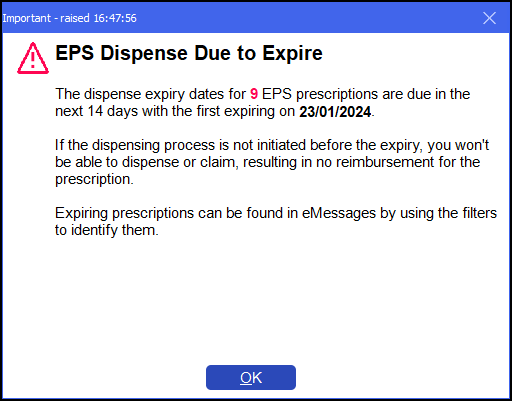
Prescriptions Retrieved but no Notification is Sent
If you retrieve and dispense a prescription but no dispense notification is sent to indicate dispensing activity, then the NHS Spine expires the prescription as if the prescription is not retrieved, 6 months after the issue date.
On start-up, Pharmacy Manager informs you if a dispense notification expiry is within 14 days for any prescriptions:
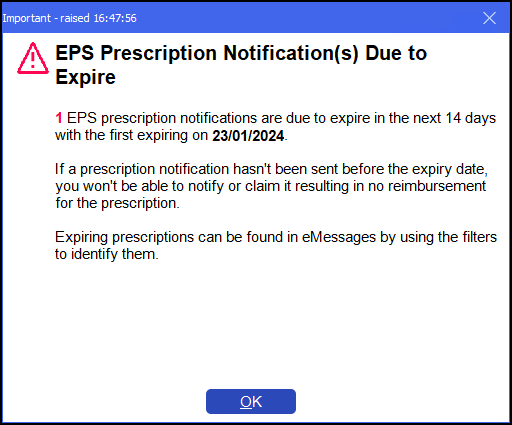
Pharmacy Manager prevents you from submitting dispense notifications after they have expired to prevent rejections from the NHS Spine.
Prescriptions Notified but no Claim is Sent
All electronic reimbursement endorsement messages (claims), must be sent within 180 days of the dispensed date, within the last sent dispense notification message. This is known as the 'claim reconciliation period'. After this period, any reimbursement submission is prevented by Pharmacy Manager as they are not accepted by the NHS Spine.
On start-up, Pharmacy Manager informs you if a reimbursement claim expiry is imminent for any prescriptions, for example, within 14 days of their expiry:
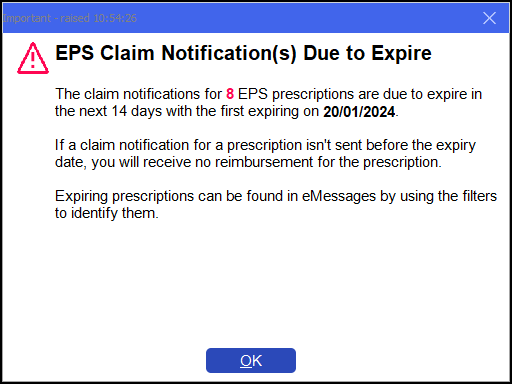
If the due date has passed and claims are not submitted, Pharmacy Manager informs you.
Recalculated Dispense Notification Expiry Dates
In some instances the opportunity to claim is lost if a timely dispense notification (marked as collected) and claim is not made.
Once an EPS R2 acute prescription is prescribed, there is a 6 months period in which dispensing must take place and the dispense notification made. Furthermore, the claim must be submitted within 180 days of dispensing, marked as collected.
If you do not make submissions in a timely manner, the discrepancy between the two expiry windows may mean you can still make a dispense notification, but you have lost the opportunity to make a claim.
It is important that you collect and notify a prescription in Pharmacy Manager as soon as it leaves the pharmacy.
Example scenario 1
An acute prescription or the first iteration of a repeat prescription can have a dispense notification expiry date of 6 months, which occasionally exceeds the claim window (which is only 180 days) albeit only by a day or two. If you overlook making a dispense notification you could be in a situation where you may eventually submit a valid notification only to find out you are unable to make the subsequent claim:
-
An acute prescription is prescribed on 1st May, therefore the dispense notification expiry is 30th October
-
If the prescription is dispensed on either 1st May or 2nd May the claim expiry expires on the 28th October and 29th October respectively (180 days later) and could possibly be exceeded by a late dispense notification.
-
Leaving the dispense notification to the last day renders the prescription unclaimable.
Example scenario 2
Iterations of a repeating prescription , after the initial iteration, can have a dispense notification expiry date, of 12 months, which exceeds the claim window of 180 days. If you overlook making a dispense notification you could be in a situation where you may eventually submit a valid notification only to find out you are unable to make the subsequent claim:
-
A repeat prescription for 12 x 28 day iterations is prescribed on 3rd January when the first iteration is also dispensed.
-
The second iteration is dispensed 28 days later on 31st January.
-
At this point, the dispense notification expiry is 3rd January the following year, but the claim expiry for the second iteration is 29th July (180 days on from 31st January ).
-
Consequently, Pharmacy Manager recalculates the dispense notification expiry in line with the claim expiry and alerts you accordingly.
-
This recalculation takes place for every iteration up to and including the seventh iteration.
-
The eighth iteration is then dispensed on 18th July .
-
At this point, the dispense notification expiry remains 3rd January, whilst the claim expiry is now 14th January the following year, 180 days on from 18th July.
In this case, there is no need to recalculate the dispense expiry date as all the remaining claims occur after the respective dispense notifications need to be made.
Expiry Rules Summary
The following table outlines the rules regarding expiry of dispense notifications and claims as summarised above. Many represent rare occurrences that you are unlikely to encounter if dispense notifications and claims are made in a timely fashion.
Pharmacy Manager provides ample and frequent reminders about any imminent prescription expiry, however, should you leave a prescription to expire, Pharmacy Manager prevents it being submitted when the only outcome is for the dispense notification (or claim) to be rejected by the NHS Spine:
|
Scenario |
How Pharmacy Manager Works |
|---|---|
|
Downloaded prescription for a non-controlled drug item with no activity |
The prescription expires 6 months from the issue date |
|
Downloaded prescription for a non-controlled drug item which has been dispensed, but no dispense notification has been submitted |
The prescription expires 6 months from the issue date |
|
After a prescription for a non-controlled drug item has had a successful final dispense notification |
The claim expires 180 days after the dispensing date within the last dispense notification |
|
A prescription for a CD4 item (or a prescription containing one or more non-CD4 items and one or more CD4 items) with no activity |
From a Pharmacy Manager perspective, the prescription expires the CD4 items 28 days after the issue date, whilst the non-CD4 items expires 6 months after the issued date |
|
A prescription for a CD4 item (or a prescription containing one or more non-controlled drug items and one or more CD4 items) which is dispensed but no dispense notification is submitted |
The prescription expires 6 months from the issue date |
|
After a prescription for a CD4 item (or a prescription containing one or more non-controlled drug items and one or more CD4 items) has a successful dispense notification |
The claim expires 180 days after the dispensing date within the last dispense notification |
|
Iteration one of a repeat dispensing prescription with no activity |
The prescription expires 6 months from the issue date |
|
Iteration one of a repeat dispensing prescription which has been dispensed, but no dispense notification is submitted |
The prescription expires 6 months from the issue date |
|
Iteration two and above of a repeat dispensing prescription with no activity |
The prescription expires 12 months after the original prescribing date |
|
Iteration two and above of a repeat dispensing prescription which is dispensed, but no dispense notification is submitted |
The prescription expires 12 months after the original prescribing date |
|
A repeat dispensing prescription which has a successful dispense notification |
The claim expires 180 days after the dispensing date within the last dispense notification |
|
A prescription which is partially dispensed or has an owing and is held as such on the NHS Spine |
Owings in Pharmacy Manager expire at the same time as the prescription, regardless of whether or not the dispense notification is sent. If a prescription is not fully dispense notified in Pharmacy Manager, then the claim message cannot be sent. After 180 days without any further dispensing activity, items marked as partially dispensed are marked on the NHS Spine as Dispensed, and items marked as owed are marked as Not Dispensed. The NHS Spine accepts a claim for any dispensed items within a further 180 day period |
|
Downloaded prescription for a non-controlled drug item which has been partially dispensed and has a successful dispense notification |
The prescription expires 180 days from the dispensing date within the last dispense notification |
|
Downloaded prescription for a CD4 item which is partially dispensed and has a successful dispense notification |
The prescription expires 180 days from the dispensing date within the last dispense notification |
|
Iteration one of a repeat dispensing prescription which is partially dispensed and has a successful dispense notification |
The prescription expires 180 days from the dispensing date within the last dispense notification |
|
Iteration two of a repeat dispensing prescription which is partially dispensed and has a successful dispense notification |
The prescription expires 180 days from the dispensing date within the last dispense notification |
Response not received
On rare occasions you may submit a claim which is not acknowledged by the NHS Spine. On start-up, Pharmacy Manager informs you if an acknowledgement is not received:
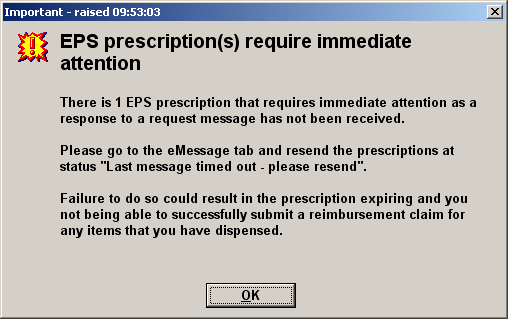
Any message with this status should be resubmitted or there is a risk, similar to a reimbursement claim expiry, of you losing reimbursement.